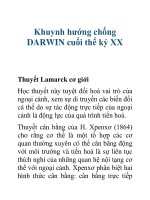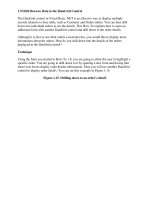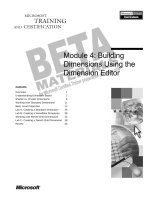Tài liệu Improving writing skills - Recommended text: The Pyramid Principle ppt
Bạn đang xem bản rút gọn của tài liệu. Xem và tải ngay bản đầy đủ của tài liệu tại đây (153.19 KB, 15 trang )
Improving our writing skills
Improving writing skills
Recommended text:
The Pyramid Principle
Several copies in library
Purpose of lectures
Introduction to structured writing and thinking
– Improves clarity
– Saves time in writing
– Is tried and tested
Explanation of Pyramid Principle
– Just an introduction to idea
– Understand technique before reading the book
Improving our writing skills
Topics
Components of effective writing
Introduction to the Pyramid Principle
– Why does it work?
– What are the rules?
– How do you build a Pyramid?
Summary/Next Steps
Key components of effective writing/presenting
The structure and content
– Is it focused?
– Is it logical? Is the thinking clear and concise?
– Does it answer the question(s) in the reader’s mind?
– Is it easy for the reader to understand?
The ‘look’ of the document
– Does it look professional?
– Has consideration been given to highlighting structure?
– Is the document well referenced?
The style of writing and presenting
– Type of introduction and conclusion
– Use of stories, anecdotes, open questions
– Use of visuals, supporting documentation
Improving our writing skills
Components of effective writing
Exercise: Take a look at the following list
– consider your reaction and think how you would
present the list to others
Young woman
11
Baby
Chair
3
Apple
Mango
Table
7
Elderly man
Teenager
Banana
Introduction to the Pyramid Principle
Overview
The mind seeks to impose order
– Sorts into pyramidal groupings to make sense
(grouping and summarising)
– Conducts Q&A sequence when presented with new
information
– Can hold approx. 7 ideas in short-term memory
To clarify our thinking we need to:
– Either verbalise our thoughts or write them down
– Undertake iterations to test and refine our thinking
Improving our writing skills
Introduction to the Pyramid Principle
For greatest clarity:
– Ideas arranged in a pyramid form
– Ideas exist under 1 main thought
– Present ideas by stating category then items
– Order from Top Down
from top of pyramid
– Think and present Bottom Up
sentences-> paragraphs -> sections …
– Paragraph contains one main idea
Sentences should relate to one main idea
– Rules are applied which enable thinking to be tested
Improving our writing skills
Example – Top Down
I was in Zurich last week — you know what a conservative city
Zurich is — and we went out to lunch at an outdoor restaurant.
Do you know that within 1 5 minutes I must have seen 1 5 people
with either a beard or a moustache.
And you know, if you walk around any New York office you can
rarely find even one person who doesn’t have sideburns or a
moustache.
And of course facial hair has been a part of the London scene for at
least 10 years.
Pyramid Rules
Ideas at any level in the pyramid must be
summaries of ideas grouped below them
Ideas in each grouping must be of the same
kind – usually labelled by one plural noun
Ideas in each grouping must be logically
ordered
– Deductively,Chronologically,Structurally,Comparatively
Improving our writing skills
Pyramid Structure
Ensuring you get the ideas in the right place
Vertical relationships (Q&A dialogue)
Horizontal relationships (logically the same, logical order)
Determine the top point
Work from the bottom
Understand Introductory flow
Vertical Relationship Example
Improving our writing skills
Building a Pyramid
Identifying the right question is fundamental
Give enough thinking time on the introduction
S = Describe the situation
C = Identify the complication (trigger for the question)
Q = Clarify the question in the reader’s mind
A = Develop the Answer (/solution, the over-riding point)
Top down construction
Improving our writing skills
Typical questions for building pyramid
Key questions tend to be:
– What should we do?
– Should we do it?
– How should we do it?
– Why did it happen?
– Why is it important?
-……
Possible responses: reasons, steps/actions, proofs, recommendations …
Example
The purpose of the exercise is to make sure you know what Question it
is you are trying to answer.
Try finding Situation, Complication, Question and the key line from the
memorandum on the next slide. It comes from the Accounting
Department of a large beverage company in the United States.
When the company’s drivers deliver the product to a customer, they
send back to the Accounting Department a delivery ticket with a set of
code numbers, the date, and the amount of the delivery. These delivery
tickets are the basis of the billing system, which works something like
this:
Takes FIVE WEEKS
Process -> Send -> Receive -> Process
delivery tickets bill check Payment
Improving our writing skills
Example
One of the company’s customers, a hamburger emporium we’ll call Big
Chief, gets an awful lot of deliveries. For its own accounting purposes, it
would like to keep daily track of how the bill is mounting up. It wants to
know if it can’t keep the delivery tickets along with each delivery, record
them on a computer tape, calculate the total, and then send the tape and
its check once a month to the headquarters office of the beverage
com-pany. In other words, it is proposing a system that would work like
this:
Propose to take ONE DAY
Receive tape -> Process
and check Payment
Improving our writing skills
Bottom Up Construction
- List all the points to be made
- Work out relationships between them
- Draw Conclusions
Writing Introductions
Remind rather than inform
Include Situation, Complication, Solution
As long as needed – history, background
Use a narrative style
Improving our writing skills
Complications - examples
Two types of logic
- Deductive
Statement followed by a comment on the statement
leads to a ‘therefore’ conclusion
– Inductive
Grouping of similar examples that explain a higher concept
Improving our writing skills
Examples – deductive arguments
Improving our writing skills
Examples – inductive arguments
Example – poor inductive argument
Improving our writing skills
Ordering a grouping
Highlighting structure – ch. 6
Checking order of grouping – ch 7
Checking problem-solving – ch 8
Checking summary statements – ch. 9
Logic in scientific reasoning - Appendix
Further Reading
Improving our writing skills
Summary/Next Steps
Developing the structure
Begin to develop pyramid
Identify the Situation, Complication, Question and Answer
Complete and test pyramid ideas/logic
Writing the document
Draft introduction
Write paragraphs using Pyramid structure
Highlight structure to assist the reader in following the logic
Practice is crucial









